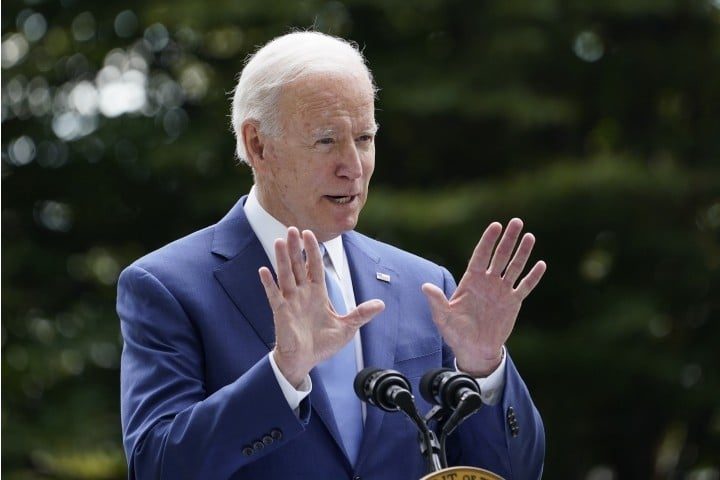
On Friday, President Joe Biden became the first U.S. president to issue a proclamation of Indigenous Peoples Day, while simultaneously citing the “wrongs and atrocities” inflicted upon them by European explorers such as Christopher Columbus. Monday is the day set aside by Congress as “Columbus Day.”
Rather than praise the monumental achievement of the great admiral of the Ocean Sea — Christopher Columbus — of ending the disconnected histories of the world, Biden chose to praise the role that Americans of Italian ancestry in general have played in the United States.
As is typical of Biden and others of his political leanings, the twin proclamations fit neatly into the Marxist worldview — that society has long been divided into oppressors and the oppressed. “For generations,” Biden said in his announcement, “federal policies systematically sought to assimilate and displace Native people and eradicate Native cultures. Today, we recognize Indigenous peoples’ resilience and strength as well as the immeasurable positive impact that they have made on every aspect of American society.”
White House Press Secretary Jen Psaki told reporters that she did not know if Biden’s next move might be to seek an end to the national holiday honoring Columbus.
If Biden’s remarks about Columbus Day this year are any indication, it would not be surprising if he did seek to abolish the day honoring the explorer. “Today, we also acknowledge the painful history of wrongs and atrocities that many European explorers inflicted on Tribal Nations and Indigenous communities,” Biden said. “It is a measure of our greatness as a nation that we do not seek to bury these shameful episodes of our past — that we face them honestly, we bring them to the light, and we do all we can to address them.”
Actually, Biden and liberals like him are highly selective in their outrage at “wrongs and atrocities” of the past. Certainly, some European explorers did not treat indigenous peoples very well. But neither did indigenous peoples always treat other indigenous peoples very well. For example, they had been fighting wars against each other for centuries before the arrival of Europeans, usually over natural resources such as land, rivers, and forests. Some indigenous peoples, such as the Aztecs and Mayas, captured other indigenous peoples and offered them up as human sacrifices to their pagan gods. Sometimes they ate them. The Spanish, for all their faults, never did either, and in fact, they ended both practices.
If Biden was facing the past “honestly,” then should that not be among the “wrongs and atrocities” that he mentioned in his proclamation?
While it was nice of Biden to say positive things about Italians, if he wanted to face the past honestly, he would have centered his remarks on one particular Italian — Christopher Columbus. Columbus’ achievement was mostly positive for people living on both sides of the Atlantic, including the “indigenous peoples.” Instead of denigrating Columbus, Biden and indigenous peoples should be singing his praises.
Columbus did not set out in August 1492 to discover America and enslave its peoples. His goal was to reach the East by sailing west. His chief objective was to take the Gospel to the peoples of Asia. He had read the works of another Italian, Marco Polo, whose family had left Venice in the 13th century and visited the court of Kublai Khan in China. Kublai Khan told the Polo family that he welcomed Christian missionaries. Based on this reading, Columbus hoped China was a field “white with harvest,” to use the words of Jesus — a place open to the Christian faith.
Once the Chinese were converted to Christianity, Columbus envisioned joining forces with them to drive the Muslims out of control of the Holy Land (which had been conquered by the Muslims), including the city of Jerusalem. Columbus believed that Jesus would return once Jerusalem was in the hands of Christians. One does not have to accept his eschatology (the doctrines about the end of the world) to understand that his motives were benevolent, not malevolent.
While Columbus’ vision was not achieved, he did introduce the Christian faith to the indigenous peoples of the Americas. Others who followed him did some bad things, but they also improved the lives of the indigenous peoples of the western world, including the abolition of human sacrifice and cannibalism. Political correctness dictates that nothing good can be said about Europeans, and nothing bad can be said about indigenous peoples. This is unrealistic. There is good and bad in the history of all peoples.
But without Columbus (or some other future adventurer), the Spanish would not have been followed by other Europeans, including the English, who planted their first permanent English settlement at Jamestown in Virginia Colony. From that humble settlement, others would make the trek across the Atlantic and establish the colonies that would eventually evolve into the United States of America. As John Adams once said, the American Revolution did not begin when the first shots were fired at Lexington and Concord in 1775, but rather in 1607 and 1620, when the colonies of Virginia and Plymouth were settled.
The Associated Press ended its story of Biden’s proclamations by noting, “It’s a break from President Donald Trump’s ardent defense of ‘intrepid heroes’ like Columbus.” Intended as praise for Biden, and an insult to Trump, it is actually a fairly succinct summary of the sorry state of affairs in America today when Columbus’ great achievement is seen as a tragedy.



